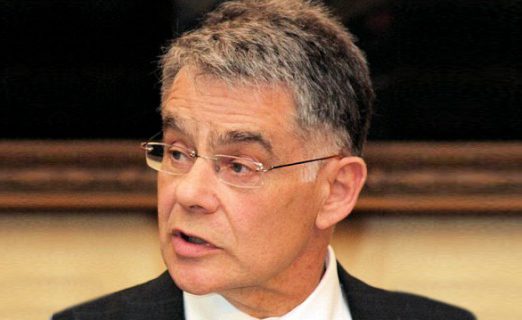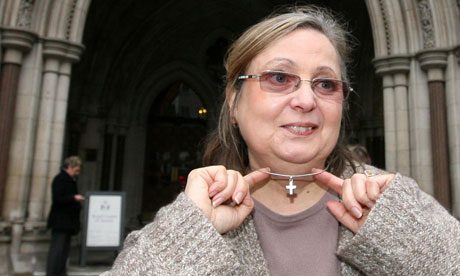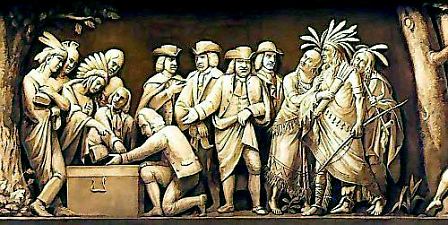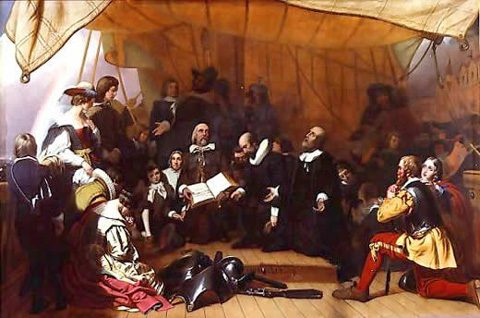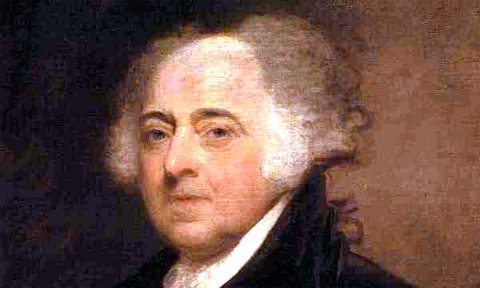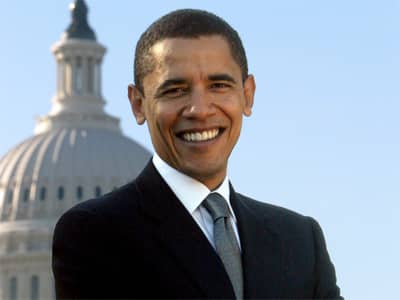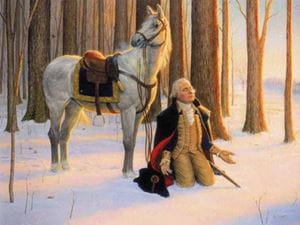
Fifty years ago on June 25, 2012, the U.S. Supreme Court banned prayer from U.S. public schools on the principle that America has no state religion – and is not officially a Christian nation.
It set the stage for today’s environment in which any high schooler who utters a prayer at graduation or any cross or nativity scene on public property is subjected to prolonged court challenges.
On June 20, New York City kindergarten students were blocked from performing the song “God Bless the USA” at their graduation ceremony after principal Greta Hawkins said the song could end up “offending” listeners and result in litigation. The song’s author, country music artist Lee Greenwood, said he was offended by Hawkins’ decision, “I wrote ‘God Bless the USA’ about the love I have for this country and the struggle we have gone through to remain free,” Greenwood said. “Personally, denying the children to sing ‘God Bless the USA’ offends me as a Christian.”
Kindergartners singing
“My song is about hope, faith, spirit and pride. How could that be wrong on any level?”
But Principal Hawkins’ fear is justified. The “Establishment Clause” of the Constitution’s First Amendment is “in shambles,” thanks to the U.S. Supreme Court, which “should be deeply troubled by what its Establishment Clause jurisprudence has wrought,” wrote Justice Thomas in a recent dissent, “like some ghoul in a late-night horror movie that repeatedly sits up in its grave and shuffles abroad after being repeatedly killed and buried …frightening the little children and school attorneys …”
But does any government have any business dabbling in religion or morality questions?
A few days ago, British Dr. Patrick Pullicino, a neurologist at East Kent Hospitals and a professor of Clinical Neurosciences at the University of Kent, startled the Royal Society of Medicine in London by disclosing that annually 130,000 elderly Britons receiving government health care are routinely hurried along on their way to the grave by bureaucrats of the United Kingdom’s National Health Service.
Dr. Patrick Pullicino
“The chilling news came to light,” reported Charlotte Meredith of the Daily Express, after Pullicino revealed NHS doctors are using the controversial “Liverpool Care Pathway” – an official policy under which “doctors can withdraw treatment, food and water while patients are heavily sedated in an attempt to make their final days pass quickly and comfortably – normally resulting in a patient’s death within 33 hours.”
“NHS doctors are prematurely ending the lives of thousands of elderly hospital patients because they are difficult to manage or to free up beds,” reported Steve Doughty for the Daily Mail newspaper.
A May 2011 Daily Mail story exposed elderly British patients being starved and dehydrated to death as government-paid medical staff routinely ignored patients’ calls for help and forgot to check that they had had enough to eat and drink. A commission found that hip replacements and cataract surgery were being put on a “non-urgent” list in an attempt to help save the state health care program $20 billion.
In the British press, Dr. Pullicino’s charges eclipsed another doctor’s story – British Dr. Richard Scott who lost his appeal against the UK’s General Medical Council, which reprimanded him for sharing his Christian faith with a patient. The council ruled that Dr. Scott had
overstepped the line” when he urged a suicidal 24-year-old patient to give Christianity a chance.
Dr. Richard Scott
“The man was depressed, and had left his own faith,” Dr. Scott told Cristina Odone of the Telegraph newspaper. “So I told him, ‘You may find that Christianity offers you something that your own faith did not.’”
Dr. Scott’s appeal, reported Odone, “was quashed Thursday, after a four-day hearing that his counsel, Paul Diamond, called ‘Stalinist.’
“It was as if I had stepped into a secret court, with the witness, Patient A, never appearing,” Dr. Scott told Odone. “He remained a faceless accuser.’”
The physician said he could not overcome the government panel’s ”bias against me” and his Christian faith. “The same council that allows doctors to promote the healing effects of homoeopathy, chiropractic and reiki, also known as palm healing — which are all unsupported by Western, evidence-based medicine, but are backed by belief systems – has banned the mere mention of faith and prayer in a consultation,” noted Odone. “Yet, as Dr Scott points out, the medical impact of prayer has been proved in a number of scientific studies.
“‘Christians recover 70 per cent faster,’ he says. ‘They’re also less likely to get depressed. In America, medical schools have even introduced spirituality and health courses because they recognize the significant role of faith as part of therapy.’”
But England isn’t America, observes Odone.
Only days earlier, two British women appealed to the European Court of Human Rights after British panels ruled they have no right to wear Christian crosses as jewelry. Nadia Eweida and Shirley Chaplin both had sought help from the British government when their employers barred them from wearing crosses.
Nadia Eweida
Instead, the government ruled that they had no such right because displaying a cross is not a “requirement” of the Christian faith, unlike a Muslim woman who is required to wear a veil or a Sikh man obligated to wear a turban and ceremonial dagger.
Ironically, Great Britain is officially a Christian nation. Because it is, America is not.
That distinction was intentional because America’s founders had chaffed under the abuses of a state religion. Queen Elizabeth II’s formal title is “Queen Elizabeth the Second, by the Grace of God Queen of this Realm and of Her other Realms and Territories, Head of the Commonwealth, Defender of the Faith.” The faith is the Church of England – of which she is the official head.
America’s founders repudiated such a state faith, writes Michael I. Meyerson, author of the just released Endowed By Our Creator: The Birth of Religious Freedom in America from Yale University Press. “The framers believed that the American government should neither fund religion nor acknowledge religion in a way that favors any particular creed or denomination.”
However, it is a serious mistake to believe America’s founders were anti-Christian. Indeed, all 13 of the original colonies had deep Christian roots, according to the research website ProCon.org.
Virginia had as its official religion the Church of England as did
Maryland and both Carolinas.
Church attendance in Virginia was required by a gubernatorial decree in 1617: “Every Person should go to church, Sundays and Holidays, or lye Neck and Heels that Night, and be a Slave to the Colony the following Week; for the second Offence, he should be a Slave for a Month; and for the third, a Year and a Day.”
Michael I. Meyerson
In 1776, the colony issued the Virginia Declaration of Rights, which included this clause: “That religion, or the duty which we owe to our Creator and the manner of discharging it, can be directed by reason and conviction, not by force or violence; and therefore, all men are equally entitled to the free exercise of religion, according to the dictates of conscience; and that it is the mutual duty of all to practice Christian forbearance, love, and charity towards each other.”
Each of the other colonies had similar clauses embracing our Christian heritage in their charters and subsequent constitutions. Pennsylvania, Georgia, New Jersey, Delaware and New York had no official religion. However, each had statements such as found in Delaware’s 1701 charter stating:
“Almighty God being the only Lord of Conscience, Father of Lights and Spirits; and the Author as well as Object of all divine Knowledge, Faith and Worship, who only doth enlighten the Minds, and persuade and convince the Understandings of People, I do hereby grant and declare, That no Person or Persons, inhabiting in this Province or Territories, who shall confess and acknowledge Our almighty God, the Creator, Upholder and Ruler of the world; and professes him or themselves obliged to live quietly under the Civil Government, shall be in any Case molested or prejudiced, in his or their Person or Estate, because of his or their consciencious Persuasion or Practice, nor be compelled to frequent or maintain any religious Worship, Place or Ministry, contrary to his or their Mind, or to do or suffer any other Act or Thing, contrary to their religious Persuasion. And that all Persons who also profess to believe in Jesus Christ, the Saviour of the World, shall be capable (notwithstanding their other Persuasions and Practices in Point of Conscience and Religion) to serve this Government in any Capacity, both legislatively and executively…”
Similar statements are found in Georgia’s founding documents, such as its 1732 charter, which stated: “[R]epresentatives… shall be of the Protestant religion… All persons whatever shall have the free exercise of their religion; provided it be not repugnant to the peace and safety of the State; and shall not, unless by consent, support any teacher or teachers except those of their own profession.”
William Penn signing a treaty with Indians
Pennsylvania – which was a refuge for the persecuted Quakers – included many such statements in its founding documents, including in its 1681 charter a requirement that all elected representatives to take the “following oath or affirmation: ‘I do believe in one God, the creator and governor of the universe, the rewarder of the good and punisher of the wicked. And I do acknowledge the Scriptures of the Old and New Testament to be given by Divine inspiration.’ And no further or other religious test shall ever hereafter be required of any civil officer or magistrate in this state.”
New York was founded by the Dutch West India Company, whose members were predominantly from the Netherlands’ Dutch Reformed Church – and traditionally tolerant of other Christian faiths. In fact, nearby Massachusetts was founded by Puritans who had fled to the Netherlands after being persecuted by the Church of England. They set off for America, believing they were called by God to establish “new Israel,” a holy commonwealth based on a covenant between God and themselves as His people.
New Hampshire and Connecticut were also officially Puritan. Connecticut’s 1662 charter declared: “Our said people, Inhabitants there, may bee soe religiously, peaceably and civilly Governed as their good life and orderly Conversacon may wynn and invite the Natives of the Country to the knowledge and obedience of the onely true God and Saviour of mankind, and the Christian faith, which in our Royall intencons and the Adventurers free profession is the onely and principall end of this Plantacon.”
The Puritans en route to Massachusetts
Rhode Island was founded by Baptist Roger Williams, who was banished from Massachusetts because he preached that the true church was a voluntary association of God’s elect and should not be dictated by any government – either the Church of England or the Puritans.
It was into this mixture that the Continental Congress strode, hoping to avoid what James Madison termed the “erroneous idea of a national religion.” But did he and the other authors of the Constitution and Bill of Rights create an absolute wall between church and state?
“Jefferson’s famous metaphor is a good but imprecise description of the complex view of the framers,” writes Meyerson. “They generally opposed the federal government financing religion or using sectarian language. However, despite what many ‘strict separatists’ believe, the framers were not afraid of all mention of religion in the public arena.
“As presidents, both Madison and Jefferson, like Washington before them, employed sincere religious language in their inaugurals. Madison gave his pious supplication to ‘the guardianship and guidance of that Almighty Being whose power regulates the destiny of nations.’
“Jefferson said: ‘I shall need, too, the favor of that Being in whose
hands we are, who led our forefathers, as Israel of old, from their native land.’”
Thomas Jefferson
“The framers created a spiritual public vocabulary that could be both appreciated as religious by those from orthodox religions. But they made sure the language was expansive enough to communicate to all, including followers of minority religions.”
And so, contrary to the various colonial charters and state constitutions, the U.S. Constitution omitted any explicit religious language, writes Meyerson, yet “it expresses some important thoughts on the relationship between religion and government.”
Baptist minister John Leland was an influential member of the Constitutional Convention. “His support was critical in James Madison’s election to the Virginia Ratifying Convention in 1788,” writes Meyerson. “He was a close friend of Thomas Jefferson, and he was a leading advocate for amending the Constitution to include provisions protecting religious liberty. Leland combined his deep personal religious faith with a desire ‘to exclude religious opinions from the list of objects of legislation.’ He once wrote that ‘Government should be so fixed, that Pagans, Turks, Jews and Christians should be equally protected in their rights.’
What about Catholics? “Many of the founders were deeply hostile to Roman Catholics,” writes Meyerson. “The Continental Congress described Catholicism as a religion that had ‘dispersed impiety, bigotry, persecution, murder and rebellion through every part of the world.’”
It should be remembered that England had long been divided over its King Henry VIII’s break with the Vatican when the pope refused to sanction his repeated divorces and execution of wives who did not bear him a son. England’s arch-enemies were the devoutly Catholic Spain and France.
“John Jay tried to punish Catholics unless, ‘they renounce and believe to be false and wicked, the dangerous and damnable doctrine, that the pope, or any other earthly authority, have power to absolve men from sins.’
“Sam Adams wrote to the Mohawk tribe that if Catholics came to power their children ‘may be induced, instead of worshipping the only true God, to pay his dues to images made with their own hands.’
“At the end of the Revolutionary war New Jersey, Delaware, North Carolina, Georgia, South Carolina, and Vermont barred Catholics from serving in government.
“Many framers, however, felt no such hostility,” writes Meyerson. ”Benjamin Franklin, in fact, was on such good terms with Pope Pius VI that the pope followed his recommendation that Marylander John Carroll be named America’s first archbishop.
“George Washington similarly admonished his troops to avoid all anti-Catholic activity, stating ‘While we are Contending for our own Liberty, we should be very cautious of violating the Rights of Conscience in others.’”
Were Jews excluded? “Maryland kept its requirement limiting office-holding to Christians until well into the 19th Century,” writes Meyerson. “In 1819, a state assembly committee proposed what was commonly termed the ‘Jew Bill,’ granting Jews the right to hold public office. The ‘Jew Bill’ finally passed in 1826, and Jews were permitted to serve in the legislature. Nonetheless, Maryland government officials were required to declare a ‘belief in the existence of God’ until this provision was ruled unconstitutional by the U.S. Supreme Court in 1961.
“There was no such official discrimination against Jews at the national level. As president, Washington wrote to a Jewish congregation in Newport, Rhode Island, ‘May the children of the Stock of Abraham, who dwell in this land, continue to merit and enjoy the good will of the other Inhabitants; while every one shall sit in safety under his own vine and fig tree, and there shall be none to make him afraid.’
Washington in prayer at Valley Forge
What about Muslims and Hindus? “When George Washington was describing his view on a local bill to raise taxes to fund Christian teachers,” writes Meyerson, “he stated that any such propose must permit those who ‘declare themselves Jews, Mahomitans or otherwise… [to] obtain proper relief.’ Thomas Jefferson said that the Virginia Statute for Religious Freedom was designed ‘to comprehend, within the mantle of its protection, the Jew and the Gentile, the Christian and Mahometan, the Hindoo, and infidel of every denomination.’”
Did the Continental Congress print and distribute Bibles? “There was a severe shortage of Bibles in America during the Revolutionary War and, in 1781, a Philadelphia printer, Robert Aitken, decided to print his own copies of the Bible. Aitken, who had previously served as the printer for the Journals of Congress, asked the Continental Congress to endorse his Bible and also to assist him financially by purchasing 2,500 Bibles, Congress declined to purchase his Bibles but did send a copy to its two chaplains, to ensure the books were accurate,” writes Meyerson.
“Congress felt no need to check the accuracy of Aitken’s publication with a Catholic priest or a rabbi; the judgment of Congress’s Protestant chaplains was sufficient. After receiving the chaplains’ report, Congress decided to permit Aitken to publicize his Bible as having been officially recommended by Congress.”
Sunday services were held weekly in the U.S. Capitol, attended regularly by presidents Jefferson and Madison. So, it is absurd to argue that America’s founders were antagonistic to Christianity.
In a 1787 speech to the Constitutional Convention, Benjamin Franklin declared: “God governs in the affairs of man. And if a sparrow cannot fall to the ground without his notice, is it probable that an empire can rise without His aid? We have been assured in the Sacred Writings that except the Lord build the house, they labor in vain that build it. I firmly believe this. I also believe that, without His concurring aid, we
shall succeed in this political building no better than the builders of Babel.”
Benjamin Franklin
At the Constitutional Convention in 1787, Franklin, disturbed by the bitter debates among the delegates, said in a speech to the convention: “I have lived, Sir, a long time, and the longer I live, the more convincing proofs I see of this truth–that God Governs in the affairs of men… We have been assured, Sir, in the Sacred Writings, that ‘except the Lord build the House, they labor in vain that build it.’ I therefore beg leave to move – that henceforth prayers imploring the assistance of Heaven, and its blessing on our deliberations, be held in this Assembly every morning before we proceed to business, and that one or more of the clergy of this city be requested to officiate in that service.”
Prayer has opened both houses of Congress ever since.
John Adams, the first vice president of the United States and America’s second president wrote in his diary on July 26, 1796, blasting atheist Thomas Paine: “The Christian religion is above all the Religions that ever prevailed or existed in ancient or modern times, the religion of Wisdom, Virtue, Equity, and Humanity. Let the Blackguard Paine say what he will; it is Resignation to God, it is Goodness itself to Man.”
John Adams
In America’s God and Country Encyclopedia of Quotations, edited by newspaper columnist William J. Federer is in the 1781, Query XVIII of Thomas Jefferson’s “Notes on that State of Virginia”:
“God who gave us life gave us liberty. And can the liberties of a nation be thought secure when we have removed their only firm basis, a conviction in the minds of the people that these liberties are of the Gift of God? That they are not to be violated but with His wrath? Indeed, I tremble for my country when I reflect that God is just; that His justice cannot sleep forever.”
On April 21, 1803 in a letter Jefferson wrote: “My views…are the result of a life of inquiry and reflection, and very different from the anti-christian system imputed to me by those who know nothing of my opinions. To the corruptions of Christianity I am, indeed, opposed; but not to the genuine precepts of Jesus himself. I am a Christian in the only sense in which he wished any one to be; sincerely attached to his doctrines in preference to all others. The doctrines of Jesus are simple, and tend to all the happiness of man. Of all the systems of morality, ancient or modern which have come under my observation, none appears to me so pure as that of Jesus….I am a real Christian, that is to say, a disciple of the doctrines of Jesus.
Alexis de Tocqueville, the French historian, traveled throughout America in the early 1830s and wrote his observations, including:
“In the United States the sovereign authority is religious. There is no country in the world where the Christian religion retains a greater influence over the souls of men than in America, and there can be no greater proof of its utility and of its conformity to human nature than that its influence is powerfully felt over the most enlightened and free nation of the earth.
“The safeguard of morality is religion, and morality is the best security of law as well as the surest pledge of freedom.
“The Americans combine the notions of Christianity and of liberty so intimately in their minds, that it is impossible to make them conceive the one without the other.
“America is great because America is good, and if America ever ceases to be good, America will cease to be great.”
Alexis de Tocqueville
And so, we find ourselves back at the question: Should America be a Christian nation?
The United States has risen to its status as the world’s only superpower because of its heritage, because of its sound foundations of faith and because of its blessing by Almighty God.
However, Christianity cannot be legislated. Great Britain’s long history of religious conflict and its current inability to protect its own elderly from callous bureaucrats is proof enough that an official religion doesn’t work – it can’t even decide whether its citizens have a right to wear crosses.
America has a long heritage of protecting all believers – and accomplishing it by establishing no state religion. The Puritans fled to Massachusetts in search of religious freedom and relief from persecution by the Church of England. Rhode Island’s founder, Roger Williams, fled Puritan Massachusetts’ attempt to legislate their own faith. William Penn gave Quakers refuge in Pennsylvania so they could escape persecution they were suffering from other American Christians.
Yet, Christianity is central to our moral system and our work ethic. It is vital to our future, but in the words of the Pentecostal author, the late David du Plessis, “God has no grandchildren.” Christianity cannot be inherited from one’s parents or founding fathers. It’s an individual choice of each believer. Each of us comes to God on a one-on-one basis.
Well-meaning legislation can require that citizens take the title “Christian,” but the result is such Christians as Britain’s heir to the throne, Charles Prince of Wales, who doesn’t seem to know what he believes – embracing anything spiritual, making him an unlikely head of the Church of England or protector of British women who want to wear crosses or doctors sharing their Christianity with suicidal patients. Morality cannot be legislated, either – it is the failure of institutionalized British Christianity to raise up a generation that puts elderly patients on the “Liverpool Care Pathway” to death because they are cantankerous or taking up too much bed space.
England needs a widespread personal revival of the Christian faith that inspired William Booth to found the Salvation Army, John Wesley to invent Methodism, Thomas of Beckett to refuse to compromise truth even at the pain of death, and William Wilberforce to trigger the worldwide abolition of slavery.
The great need today in America is an end to the confusion about the Establishment Clause. It is indeed “in shambles” and being abused to drive any display of Christianity from public view and indoctrinate our schoolchildren that Christianity is to be shunned at all costs.
Read both clauses left to us by our founders: “Congress shall make no law respecting an establishment of religion, or prohibiting the free exercise thereof.”
Freedom must be restored so that Christians can proclaim their faith without fear. Small towns should not have to quake in terror that an intolerant atheist will cost them thousands to protect a cross on the water tower or a plaque of the Ten Commandments on the wall in traffic court. Kindergartners in New York must be allowed to sing proudly – just as each U.S. President in recent memory has proclaimed at the end of his State of the Union address — “God bless the U.S.A.

